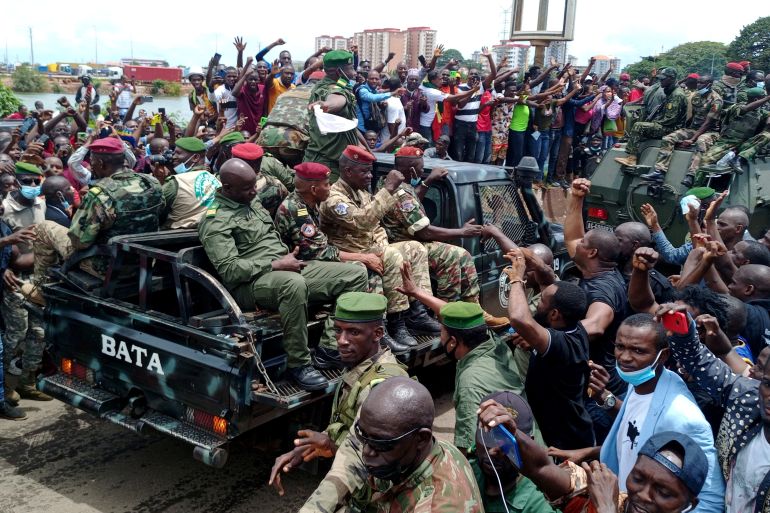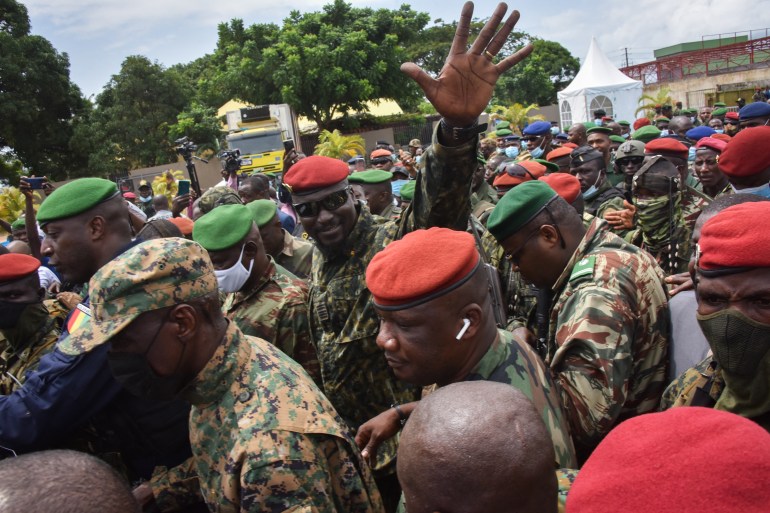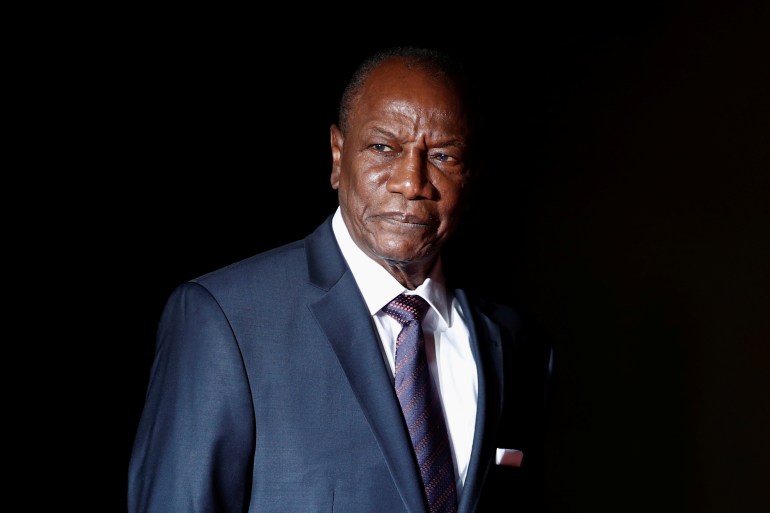Guinea coup makers name army governors, promise ‘unity’ gov’t
Coup leader Mamady Doumbouya pledges a ‘new era for governance and economic development.’

The soldiers who seized power in Guinea during the weekend have consolidated their takeover with the installation of army officers at the top of Guinea’s eight regions and various administrative districts.
West African countries have threatened sanctions following the overthrow of President Alpha Conde, who was serving a third term after altering the constitution to permit it, which his opponents said was illegal. The Economic Community of West African States (ECOWAS) regional bloc will hold a virtual extraordinary summit to discuss the situation on Wednesday.
Keep reading
list of 3 itemsGuinea coup leader bars foreign travel for government officials
What’s next for Guinea after the coup?
Coup leader Mamady Doumbouya, a former officer in the French Foreign Legion, has promised a “new era for governance and economic development”. But he has not yet explained exactly what this will entail, or given a timeframe.
“The government to be installed will be that of national unity and will ensure this political transition,” he wrote on Twitter on Tuesday.
In an announcement on Monday evening, the military called on the justice ministry to do what it can to release “political detainees” as soon as possible. Late on Tuesday, about 20 political opponents of Conde were released from detention, AFP news agency reported.
‘Endemic corruption’
Public discontent in Guinea had been brewing for months over a flatlining COVID-hit economy and the leadership of Conde, who became the first democratically elected president in 2010 and was re-elected in 2015.
But last year, Conde pushed through a new constitution that allowed him to run for a third term in October 2020.
The move sparked mass demonstrations in which dozens of protesters were killed. Conde won the October election but the political opposition maintained the poll was a sham.
Doumbouya, hours after taking power, appeared on television and accused the government of “endemic corruption” and of “trampling on citizens’ rights”.
“We are no longer going to entrust politics to one man, we are going to entrust politics to the people,” Doumbouya told public television on Sunday, with the national flag draped over his fatigues.
According to analyst Paul Melly from the Chatham House, there are big challenges ahead for the military group.
“[Doumbouya] is clearly saying all the rights thing now about a transition, about an inclusive political approach, reminding people of the need for the reforms, all the governance failures of the past.
“But the real test is going to lie really in a couple of phases over the next few weeks,” Melly added.
“First of all, in his internal discussions, he has got to secure the acquiescence if you like of a broad … political class and civil society in this transition. And although a lot of people are expressing relief … that’s not quiet the same thing as signing up for all the details of the new transition.
“And the next stage will be a difficult negotiation with ECOWAS, the West African bloc of which Guinea is a member and which really has a pretty firm constitutional law that soldiers cannot take long term power by force.”

Sunday’s military coup triggered broad diplomatic condemnation – including from the African Union, ECOWAS, the European Union and the United States – with calls for Conde’s release.
But the army’s move met jubilation in some parts of Conakry, where residents turned out on the streets to applaud passing soldiers.
Cellou Dalein Diallo, the country’s main opposition leader, also expressed his support for the new military government, in the hope that it will lead to “a peaceful democracy” in the nation of 13 million people.
On Monday, Diallo’s opposition coalition ANAD urged the ruling military to establish “legitimate institutions capable of implementing reforms” and to uphold the rule of law.
Reporting from Conakry, Al Jazeera’s Ahmed Idris said the military was trying to win the “heart and minds of Guineans, and from indicators, things seem to be going their way”.
“It seems that there is less division in the military now, and even in opposition strongholds … people are warming up to the new military leaders,” Idris added.

The coup, meanwhile, triggered concerns about supplies of bauxite, the main aluminium ore, from Guinea, the world’s second-largest producer.
The benchmark aluminium contract on the London Metal Exchange remained near a 10-year high hit on Monday.
However, mines have not reported any disruption. State-run Chinese aluminium producer Chalco’s bauxite project in Guinea said it was operating normally.
The Australian-listed bauxite and gold exploration firms Lindian Resources and Polymetals Resources also said on Tuesday that their activities were unaffected.
The Kremlin said it was closely following the political situation and that it hoped Russian business interests, which include three major bauxite mines and one alumina refinery, would not suffer.